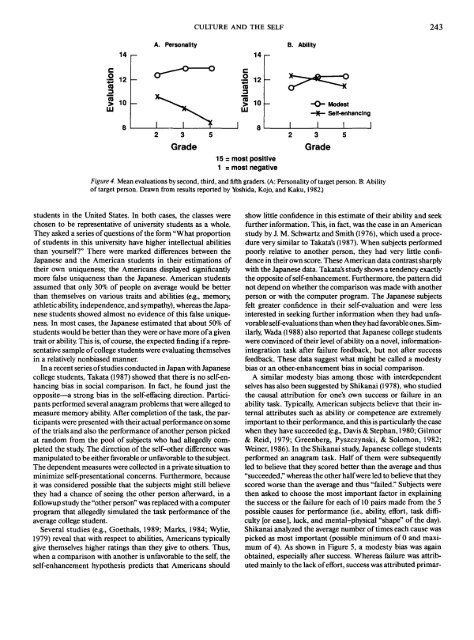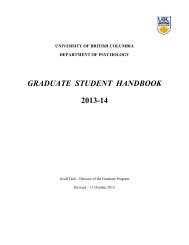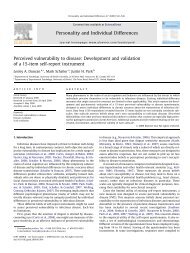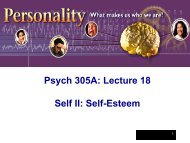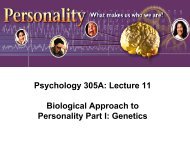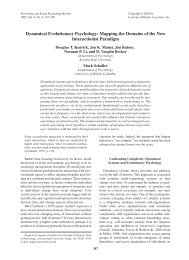Culture and the Self: Implications for Cognition, Emotion, and ... - iacmr
Culture and the Self: Implications for Cognition, Emotion, and ... - iacmr
Culture and the Self: Implications for Cognition, Emotion, and ... - iacmr
Create successful ePaper yourself
Turn your PDF publications into a flip-book with our unique Google optimized e-Paper software.
CULTURE AND THE SELF 243<br />
14 r-<br />
A. Personality B. Ability<br />
14 r-<br />
CO<br />
"ca<br />
10<br />
I «<br />
CO<br />
I 10<br />
Ul<br />
-O- Modest<br />
—K— <strong>Self</strong>-enhancing<br />
I I I<br />
Grade<br />
15 = most positive<br />
1 = most negative<br />
Grade<br />
Figure 4. Mean evaluations by second, third, <strong>and</strong> fifth graders. (A: Personality of target person. B: Ability<br />
of target person. Drawn from results reported by Yoshida, Kojo, <strong>and</strong> Kaku, 1982.)<br />
students in <strong>the</strong> United States. In both cases, <strong>the</strong> classes were<br />
chosen to be representative of university students as a whole.<br />
They asked a series of questions of <strong>the</strong> <strong>for</strong>m "What proportion<br />
of students in this university have higher intellectual abilities<br />
than yourself?" There were marked differences between <strong>the</strong><br />
Japanese <strong>and</strong> <strong>the</strong> American students in <strong>the</strong>ir estimations of<br />
<strong>the</strong>ir own uniqueness; <strong>the</strong> Americans displayed significantly<br />
more false uniqueness than <strong>the</strong> Japanese. American students<br />
assumed that only 30% of people on average would be better<br />
than <strong>the</strong>mselves on various traits <strong>and</strong> abilities (e.g., memory,<br />
athletic ability, independence, <strong>and</strong> sympathy), whereas <strong>the</strong> Japanese<br />
students showed almost no evidence of this false uniqueness.<br />
In most cases, <strong>the</strong> Japanese estimated that about 50% of<br />
students would be better than <strong>the</strong>y were or have more of a given<br />
trait or ability. This is, of course, <strong>the</strong> expected finding if a representative<br />
sample of college students were evaluating <strong>the</strong>mselves<br />
in a relatively nonbiased manner.<br />
In a recent series of studies conducted in Japan with Japanese<br />
college students, Takata (1987) showed that <strong>the</strong>re is no self-enhancing<br />
bias in social comparison. In fact, he found just <strong>the</strong><br />
opposite—a strong bias in <strong>the</strong> self-effacing direction. Participants<br />
per<strong>for</strong>med several anagram problems that were alleged to<br />
measure memory ability. After completion of <strong>the</strong> task, <strong>the</strong> participants<br />
were presented with <strong>the</strong>ir actual per<strong>for</strong>mance on some<br />
of <strong>the</strong> trials <strong>and</strong> also <strong>the</strong> per<strong>for</strong>mance of ano<strong>the</strong>r person picked<br />
at r<strong>and</strong>om from <strong>the</strong> pool of subjects who had allegedly completed<br />
<strong>the</strong> study. The direction of <strong>the</strong> self-o<strong>the</strong>r difference was<br />
manipulated to be ei<strong>the</strong>r favorable or unfavorable to <strong>the</strong> subject.<br />
The dependent measures were collected in a private situation to<br />
minimize self-presentational concerns. Fur<strong>the</strong>rmore, because<br />
it was considered possible that <strong>the</strong> subjects might still believe<br />
<strong>the</strong>y had a chance of seeing <strong>the</strong> o<strong>the</strong>r person afterward, in a<br />
followup study <strong>the</strong> "o<strong>the</strong>r person" was replaced with a computer<br />
program that allegedly simulated <strong>the</strong> task per<strong>for</strong>mance of <strong>the</strong><br />
average college student.<br />
Several studies (e.g., Goethals, 1989; Marks, 1984; Wylie,<br />
1979) reveal that with respect to abilities, Americans typically<br />
give <strong>the</strong>mselves higher ratings than <strong>the</strong>y give to o<strong>the</strong>rs. Thus,<br />
when a comparison with ano<strong>the</strong>r is unfavorable to <strong>the</strong> self, <strong>the</strong><br />
self-enhancement hypo<strong>the</strong>sis predicts that Americans should<br />
show little confidence in this estimate of <strong>the</strong>ir ability <strong>and</strong> seek<br />
fur<strong>the</strong>r in<strong>for</strong>mation. This, in fact, was <strong>the</strong> case in an American<br />
study by J. M. Schwartz <strong>and</strong> Smith (1976), which used a procedure<br />
very similar to Takata's (1987). When subjects per<strong>for</strong>med<br />
poorly relative to ano<strong>the</strong>r person, <strong>the</strong>y had very little confidence<br />
in <strong>the</strong>ir own score. These American data contrast sharply<br />
with <strong>the</strong> Japanese data. Takata's study shows a tendency exactly<br />
<strong>the</strong> opposite of self-enhancement. Fur<strong>the</strong>rmore, <strong>the</strong> pattern did<br />
not depend on whe<strong>the</strong>r <strong>the</strong> comparison was made with ano<strong>the</strong>r<br />
person or with <strong>the</strong> computer program. The Japanese subjects<br />
felt greater confidence in <strong>the</strong>ir self-evaluation <strong>and</strong> were less<br />
interested in seeking fur<strong>the</strong>r in<strong>for</strong>mation when <strong>the</strong>y had unfavorable<br />
self-evaluations than when <strong>the</strong>y had favorable ones. Similarly,<br />
Wada (1988) also reported that Japanese college students<br />
were convinced of <strong>the</strong>ir level of ability on a novel, in<strong>for</strong>mationintegration<br />
task after failure feedback, but not after success<br />
feedback. These data suggest what might be called a modesty<br />
bias or an o<strong>the</strong>r-enhancement bias in social comparison.<br />
A similar modesty bias among those with interdependent<br />
selves has also been suggested by Shikanai (1978), who studied<br />
<strong>the</strong> causal attribution <strong>for</strong> one's own success or failure in an<br />
ability task. Typically, American subjects believe that <strong>the</strong>ir internal<br />
attributes such as ability or competence are extremely<br />
important to <strong>the</strong>ir per<strong>for</strong>mance, <strong>and</strong> this is particularly <strong>the</strong> case<br />
when <strong>the</strong>y have succeeded (e.g., Davis & Stephan, 1980; Gilmor<br />
& Reid, 1979; Greenberg, Pyszczynski, & Solomon, 1982;<br />
Weiner, 1986). In <strong>the</strong> Shikanai study, Japanese college students<br />
per<strong>for</strong>med an anagram task. Half of <strong>the</strong>m were subsequently<br />
led to believe that <strong>the</strong>y scored better than <strong>the</strong> average <strong>and</strong> thus<br />
"succeeded," whereas <strong>the</strong> o<strong>the</strong>r half were led to believe that <strong>the</strong>y<br />
scored worse than <strong>the</strong> average <strong>and</strong> thus "failed." Subjects were<br />
<strong>the</strong>n asked to choose <strong>the</strong> most important factor in explaining<br />
<strong>the</strong> success or <strong>the</strong> failure <strong>for</strong> each of 10 pairs made from <strong>the</strong> 5<br />
possible causes <strong>for</strong> per<strong>for</strong>mance (i.e., ability, ef<strong>for</strong>t, task difficulty<br />
[or ease], luck, <strong>and</strong> mental-physical "shape" of <strong>the</strong> day).<br />
Shikanai analyzed <strong>the</strong> average number of times each cause was<br />
picked as most important (possible minimum of 0 <strong>and</strong> maximum<br />
of 4). As shown in Figure 5, a modesty bias was again<br />
obtained, especially after success. Whereas failure was attributed<br />
mainly to <strong>the</strong> lack of ef<strong>for</strong>t, success was attributed primar-


